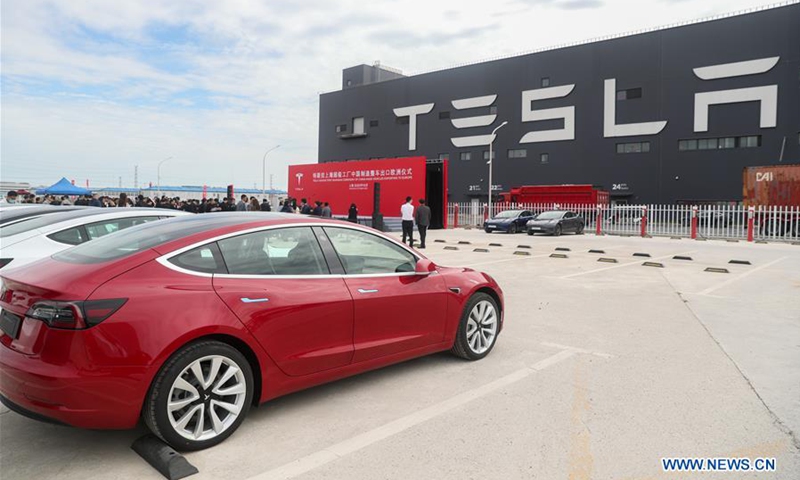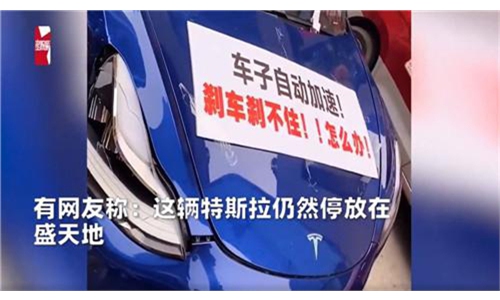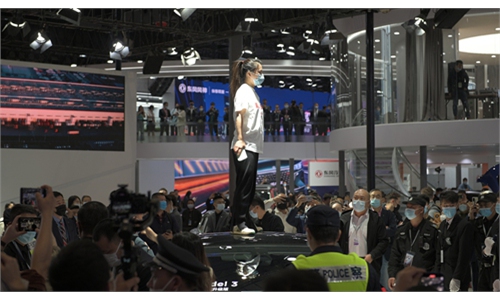
Photo taken on Oct. 26, 2020 shows the Tesla China-made Model 3 vehicles at its gigafactory in Shanghai, east China. Photo: Xinhua
US electric carmaker Tesla is under serious fire in China in what could be the biggest public relations crisis for the otherwise highly popular company in the Chinese market. Even after the firm issued a lengthy apology on Tuesday night, the firestorm continued on Wednesday, with criticism from various authorities. A local market regulator even ordered Tesla to "unconditionally" turn over data to an owner involved in an accident.The blunder was created by the company itself and could have been avoided. After a Tesla owner climbed on top of a car's roof at the Shanghai Auto Show on Monday to protest against what she claimed to be a brake malfunction, Tao Lin, vice president of Tesla, reportedly lashed out against the protestor with a series of allegations and the company followed up with a statement stating that it "would not compromise" against "unreasonable demand."
The response quickly elicited criticism from the Chinese public and various authorities in China, where many called the statement arrogant and overbearing.
The simmering pressure of public opinion eventually made Tesla bow its head, with an apology letter, in which it vowed to respect consumers and abide by laws and regulations. The apology marked a 180-degree turn from its initial response; however, it may have been too late, as criticism continues to fly in.
Clearly, the way the car owner protested was inappropriate and even illegal. That is why she has been put under police detention for five days. However, the arrogant and overbearing stance the company exhibited in front of the public is repugnant and unacceptable, which could inflict serious damage on its reputation and customer base in the Chinese market.
Obviously, there is a lesson here for Tesla to learn that it must treat complaints made by consumers more seriously and with respect. In addition to conducting thorough investigation, the company might also need to rethink its public relations strategy in China and make necessary changes to win consumers' trust.
But this goes beyond Tesla. The company's blunder also offers a valuable lesson for other foreign businesses that are already in the Chinese market or plan to come to China. With Chinese consumers' growing awareness of safeguarding their rights, similar disputes and incidents could be inevitable in the future.
In fact, Tesla is not the only foreign company that has been accused of disrespecting Chinese consumers.
In March 2017, after being exposed by China Central Television as making false claims in the Chinese market, Nike admitted that some of its sneakers sold in China didn't contain the air bags the US version of shoes had, leading to a backlash among local customers.
In April 2019, a viral video showing a woman sitting on the hood of a showroom car in protest of the dealer's handling of an oil leak in her brand-new Mercedes-Benz sedan blew up on the Internet. A settlement deal was eventually reached between the customer and Mercedes-Benz amid widespread public attention.
These incidents, including the latest one with Tesla, have sparked discussion in China over consumer rights protection and the need to improve and expand channels for consumers to lodge complaints properly and effectively.
However, for foreign businesses, this should be a clear reminder that they not only have to follow Chinese laws and regulations but must also respect Chinese consumers. Arrogance will only lead to damage on their reputation and even operations in China.
China will continue to open up its market to foreign businesses, but that does not mean foreign companies will be offered any privilege. That is also true for Tesla. The company has enjoyed sufficient support and widespread popularity in China but that does not give it the right to treat consumers disrespectfully and arrogantly.



